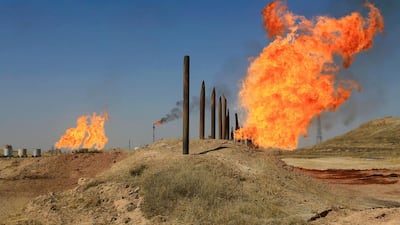BP has signed an agreement with the federal government in Iraq to ramp up production from Kirkuk, one of the largest oil fields in the Middle East.
The oil major has been asked by the Iraqi oil ministry to boost production capacity from the field to more than 700,000 barrels per day (bpd), after it was reclaimed by Baghdad from Kurdish forces last October.
BP's representative Michael Townsend signed the memorandum of understanding with the ministry to develop the field, that had become a flashpoint between Baghdad and the semi-autonomous Kurdistan Regional Government, which hinged its plans for independence on crude exports.
Kirkuk was the biggest oil field in the region when it was discovered in the late 1920s and had maintained a production level of around 600,000 bpd.
Iraqi Kurdistan's bid for independence last year and the aftermath of a referendum on breaking away, slowed exports from the field through the Ceyhan pipeline to less than half of its usual capacity, and pushed oil prices close to US$60 per barrel by late October.
____________
Read more:
Iraq to reach 'zero gas flaring' by 2021, says oil minister
Exclusive: Petronas confirms exit from Iraq's Majnoon oilfield
____________
The Iraqi government eventually took over the city of Kirkuk as well its namesake oil field, which along with associated concessions accounts for nearly 15 per cent of Iraq's total output.
The oil ministry has since undertaken efforts to build a new pipeline to ship oil from Kirkuk to Turkey's Ceyhan port. The proposed pipeline will replace parts of existing Kirkuk-Ceyhan pipeline that had been damaged during the fighting.
Iraq has since boosted output as well as export capacity from its southern fields to offset loss of production from the north.
"Our export capabilities increased in the south of the country to 4.6 million bpd," said Jabbar Al Luaibi, the country's oil minister in Abu Dhabi last week
He added that Iraq was close to achieving its target of five million bpd.
Iraq, the second the largest producer of oil within Opec after Saudi Arabia, is balancing the need to raise output to finance its post-ISIL reconstruction efforts while maintaining production cut quotas as part of an agreement with other fellow oil exporting states to stabilise prices.
It registered an output of 4.360 million bpd, according to its official sources and 4.396 million bpd according to secondary sources, as per the latest Opec monthly report. The oil ministry in December also set in motion the takeover of Majnoon, one of the largest oil fields in the world, following the exit of majority stakeholder Shell from the southern concession.
The National reported that Malaysia's Petronas, which is a stakeholder on the field will exit the concession by the end of June.


